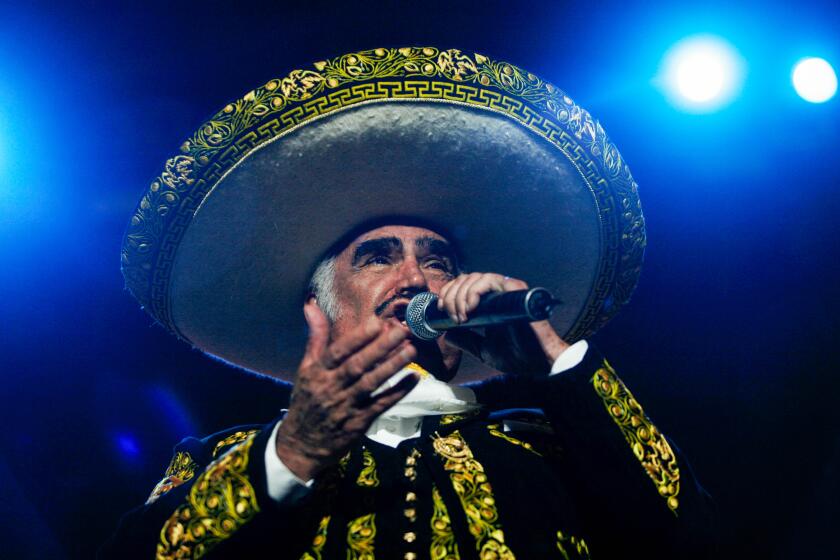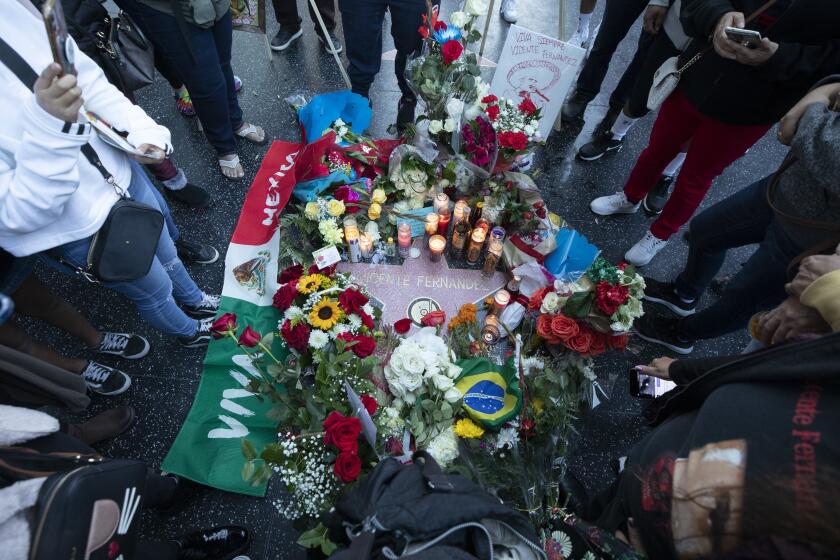Should Vicente Fernández get a street in Boyle Heights? Question exposes a divided legacy
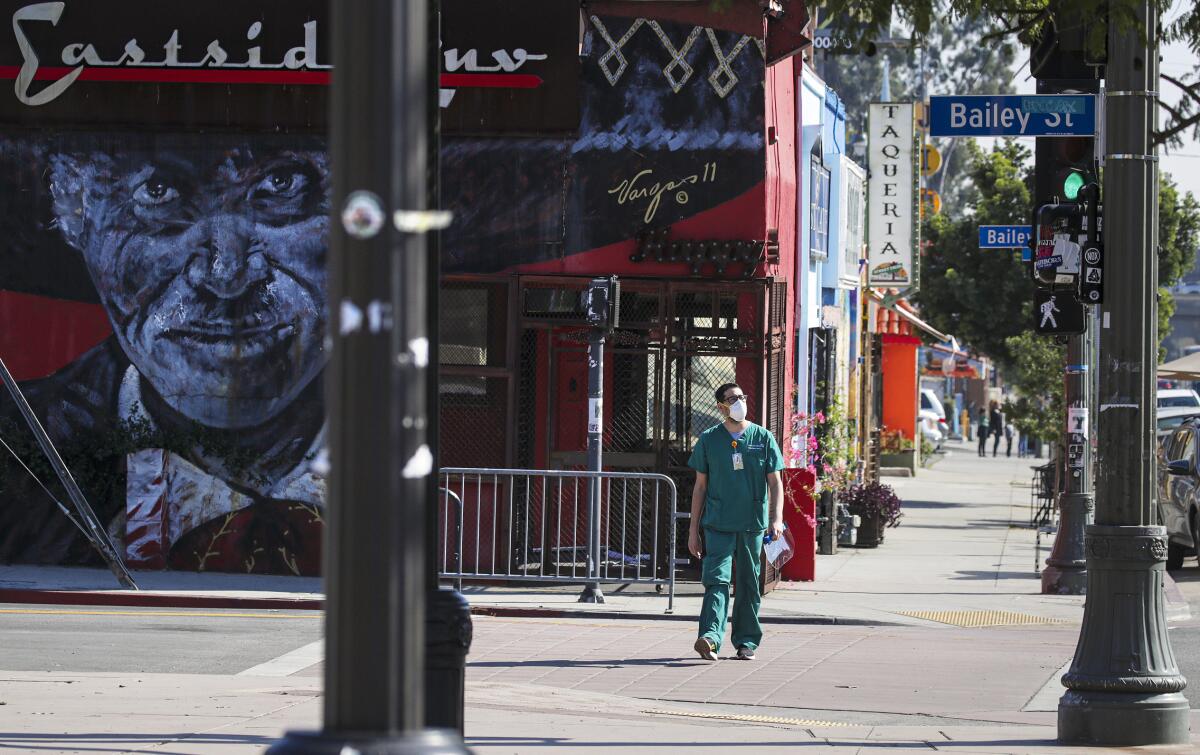
- Share via
Bailey Street passes Mariachi Plaza, where mariachis hang out looking to be hired, before dead-ending at White Memorial hospital.
This section of it is all of one block long. Other than the plaza, it is bordered by a parking lot and some houses.
But the unassuming Boyle Heights street has become a flashpoint for conflicting opinions about the legendary Mexican ranchera singer Vicente Fernández, who died in December at age 81.
A proposal to rename the block after the wildly popular and beloved Fernández has run into opposition from residents and activists who cite his homophobic remarks and allegations that he sexually harassed a woman.
Well beyond the Eastside neighborhood, Latinos everywhere have been tearfully mourning “Chente,” reminding others to factor in his missteps or in some cases reconciling their own mixed feelings.
The divides exposed by Fernández’s death are already familiar to those hashing out differences over issues like COVID-19 vaccinations, the term “Latinx” and how much to call out the behavior of elders steeped in old-school machismo culture.
How to memorialize Chente, flaws and all, is the latest manifestation of a fraught generational and ideological debate among Latinos.
Kevin de León, the Los Angeles city councilman who represents the area, called Fernández the “jefe de jefes” in a motion he submitted to his colleagues to rename Bailey Street between First Street and Pennsylvania Avenue.
But some members of the Boyle Heights Neighborhood Council were taken aback by the proposal.
De León had moved ahead without consulting them, they said, relying instead on feedback from pro-Fernández mariachis.
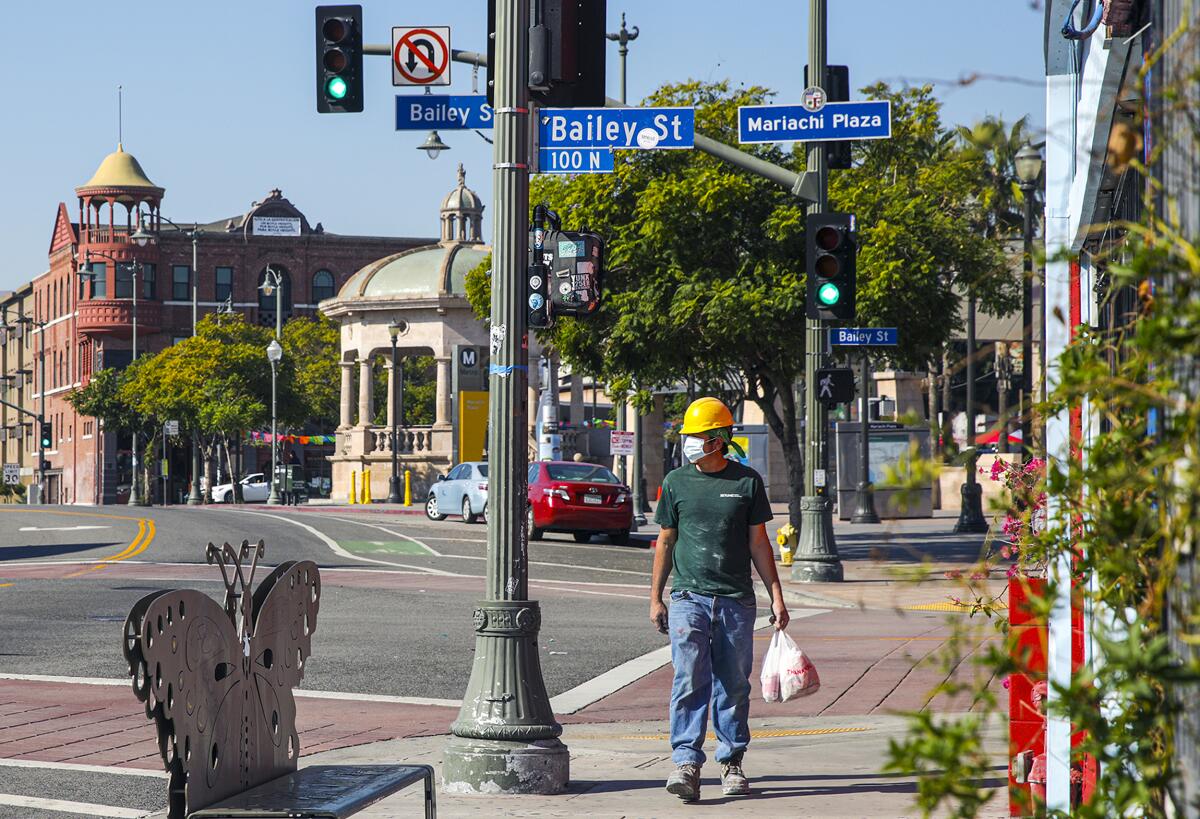
In a draft letter to De León, members of the neighborhood council’s Planning and Land Use Committee referenced a 2012 television interview in which Fernández said he refused a liver transplant because he was concerned that the donor was a “homosexual or drug addict.”
The letter also cited a 2021 report that the singer, who won three Grammys, eight Latin Grammys and a star on the Hollywood Walk of Fame, groped a young woman.
The controversy over the proposed street renaming was first reported by Boyle Heights Beat and LA Taco.
“Kevin de León’s office ignored us and instead reached out to mariachis and mariachi businesses and got a really skewed perspective of what the community wanted,” said David Silvas, the council’s vice president.
Silvas, 36, is a real estate agent and vice president of the nonprofit Boyle Heights Community Partners, which works to preserve historic buildings.
He is of Hungarian and Romanian descent and lives in Glassell Park but has deep roots in Boyle Heights — his great-grandfather moved there in the 1920s.
He said he opposes the name change because he wants “more inclusion” for Boyle Heights residents and respect for those who have often been ignored, particularly LGBTQ people.
Carlos Montes, who serves on the neighborhood council, has grappled with Fernández’s shortcomings.
Montes, 74, is a longtime Chicano activist and founding partner of the Brown Berets. He was a key organizer of the Chicano Moratorium and East L.A. student walkouts.
Fernández should be honored despite his flaws, he said.
“To not name the street after Vicente would be an outrage, honestly, and make us look bad locally and internationally,” said Montes, a longtime Boyle Heights resident. “We support LGBTQ+ rights, but there are better ways to do that than to just throw away the accomplishments of a major cultural hero who is beloved here.”
In honor of legendary singer Vicente Fernández, who died in December, City Councilman Kevin de León wants to rename a street near Mariachi Plaza.
Eddie Martinez, executive director of the Latino Equity Alliance in Boyle Heights, weighed Fernández’s sentimental value against his bad behavior and came out on the other side.
The alliance, which champions LGBTQ rights and advocates on behalf of youth, opposes naming the street after Fernández.
“It’s tough for someone who’s queer and brown and who loves the music,” said Martinez, 53, who is also vice mayor of Huntington Park. “My mom is a big, big fan, and the music is great. But I don’t like those comments, and we have to recognize that they’re problematic.”
At a Jan. 26 Boyle Heights Neighborhood Council meeting, dozens of residents spoke in favor of the renaming, with six opposed.
One resident, Mari Garcia, said she wanted Fernández to join Cesar Chavez as Latino icons with Boyle Heights streets named after them.
The council voted to send the draft letter opposing Vicente Fernández Street back to its land use committee, which will develop a general policy on street renaming.
De León declined to be interviewed by the Times.
His chief of staff, Jennifer Barraza, said the councilman plans to push forward with the name change. The proposal has moved to the City Council’s Public Works Committee, which will investigative the cost and the number of new signs that would be required.
Staff members spoke to businesses and residents around Bailey Street and “didn’t receive any flak,” Barraza said.
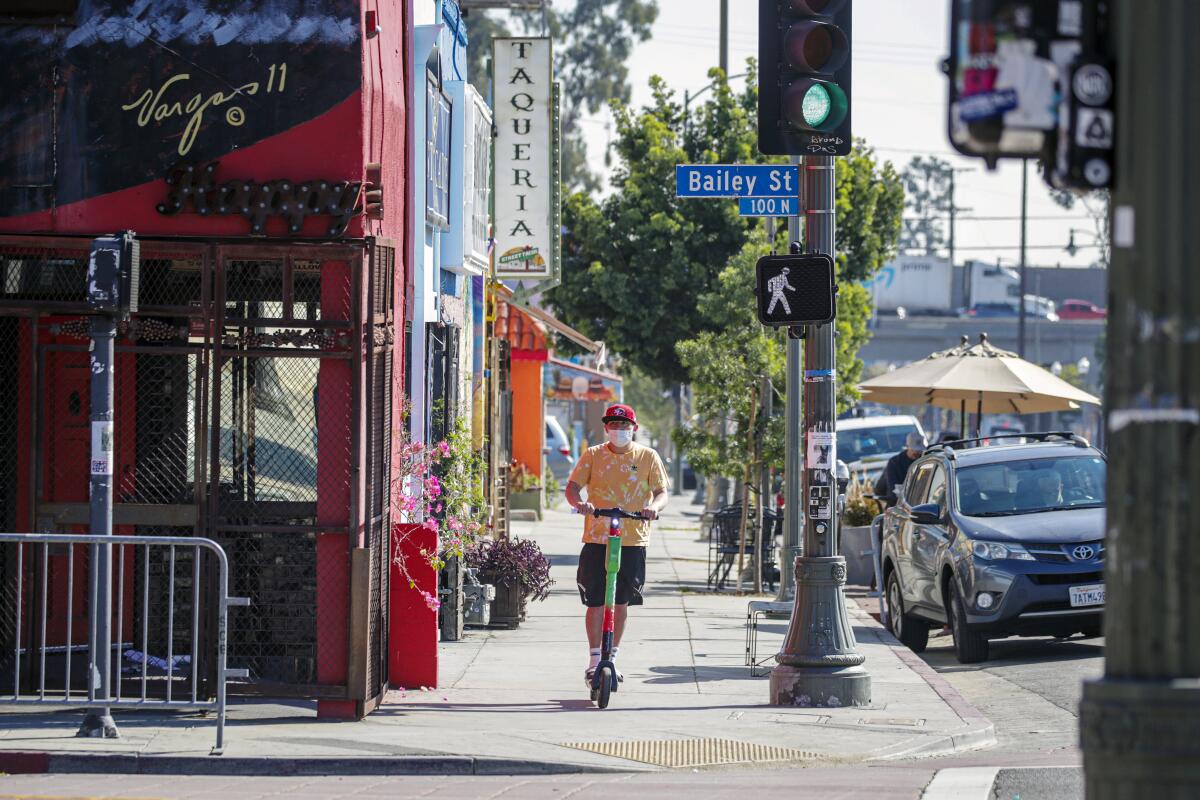
Fernández was a human being — flawed like any other — who gave Latino immigrants comfort during their hard journeys, she said.
“For Latino families in Los Angeles and around the globe, he made us proud of who we are,” Barraza said. “He saw us when the rest of the world pretended we were invisible.”
At Mariachi Plaza on a recent afternoon, singer Maricela Martinez spoke about Fernández’s legacy while waiting for her next gig. She was so moved by the proposed name change that she cried when she heard about it.
“I don’t know a mariachi in Boyle Heights or anywhere who doesn’t play at least one of his songs,” said Martinez, 40, founder of the all-female Mariachi Lindas Mexicanas. “You hear his name and his music every day, every gig, every hour.”
Fernández represents a machismo in Mexican culture that is “changing too slowly,” she said.
But he also empowered her as a young girl, making her believe her dreams were possible. Her father was a mariachi, but she always thought the profession wasn’t for girls.
At a concert in Juarez, Mexico, when she was 12, Fernández pulled her onstage, and they sang “Hermoso Cariño” together.
“Being up there made me think I could be a mariachi in a time when girls weren’t mariachis,” she said.
For some immigrants, Fernández’s music speaks to their desire for a better life in the U.S. — and the emotional toll that has taken.
They blared his songs from speakers in homes and cars and at shops and restaurants. Mourners piled flowers and candles around his star at the Hollywood Walk of Fame.
Marisol, 22, a Boyle Heights resident who has temporary legal status through the Deferred Action for Childhood Arrivals program, has cried many times listening to “Los Mandados” — perhaps Fernández’s most famous immigration ballad.
“When you grow up in the Eastside, you run into so many immigrants struggling to make it,” said Marisol, who would not give her last name because of concerns about her immigration status. “That song speaks to many in this community and all over the country.”
She is disappointed by the sexual harassment allegations. But Fernández’s “life shouldn’t be defined by one error, but by all the people he inspired,” she said.
For two decades, master tailor Jorge Tello has sewn mariachi outfits and other traditional Mexican clothing at La Casa Del Mariachi near First and Bailey. The tailor shop and other small businesses have suffered in the pandemic.
“I understand why some people are upset, but this is good news and publicity that is really needed for the small shops, restaurants and the mariachis,” Tello said.
Boyle Heights native Matthew Nava recites poetry in the plaza and worked as a barback at Eastside Luv, a nightclub near Mariachi Plaza, from 2008 to 2010.
Nava, 36, supports the name change, ideally with a plaque detailing both Fernández’s successes and faults.
At the club, his clientele mostly consisted of Latinos born in the U.S. The music was mostly American, too — punk, rock, hip-hop and rap.
Still, evenings usually closed out with a Fernández classic — “Volver, Volver” or “El Rey.”
Times staff writers Priscella Vega and Christie D’Zurilla contributed to this report.
More to Read
Sign up for Essential California
The most important California stories and recommendations in your inbox every morning.
You may occasionally receive promotional content from the Los Angeles Times.

